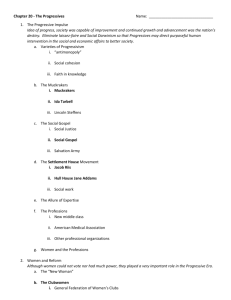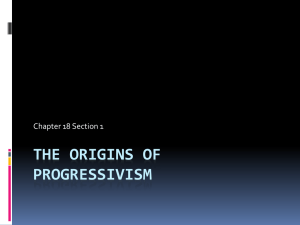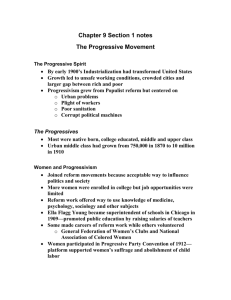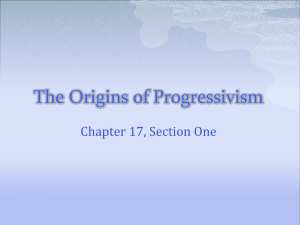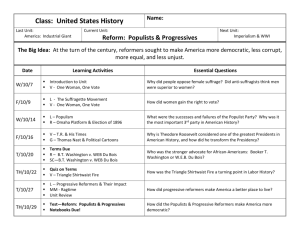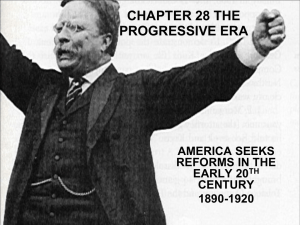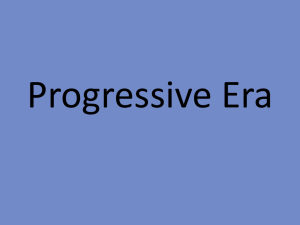UNIT 2 * THE PROGRESSIVE ERA
advertisement
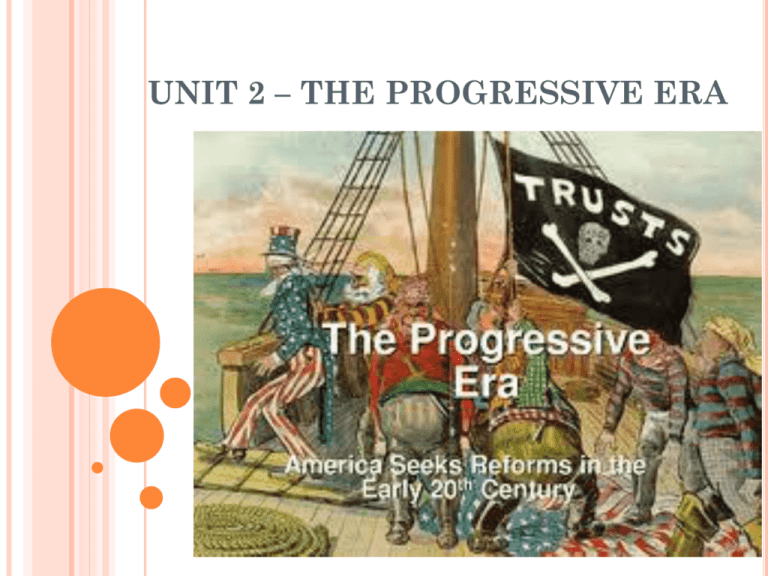
UNIT 2 – THE PROGRESSIVE ERA THE BIG QUESTIONS: How did farmers respond to the problems they faced in the late 19th Century? How did muckrakers and other Progressives reform American Society? What has been the legacy of the Progressive Presidents? How was the move toward realism reflected in American art and literature? THE AGRARIAN MOVEMENT In the 19th Century, the majority of Americans still lived on farms The extension of farming to the Great Plains and the greater use of machinery and fertilizer led to an abundance of crops Farmers faced more difficulties as food prices dropped (supply and demand) but expenses stayed high THE GRANGE MOVEMENT Founded in 1867 Purpose was to serve as a social club for farmers, help overcome isolation, and spread technological information 1.5 million members in 10 years Began urging economic and political reform CONTINUED… Formed cooperatives and tried to eliminate the “middle man” bought machinery, fertilizer, and manufactured goods in large numbers for a discount Sold directly to city markets Many failed due to lack of business experience CONTINUED… The Granger Laws Farmers blamed railroads for difficulties (overcharged) Some states elected Grangers to reform laws (regulating railroad and grain storage rates) Munn v. Illinois (1877) – Supreme Court upheld the right of a state to regulate businesses that affect public interest within the state Reversed in 1886 – said only Congress could regulate Interstate Commerce Act (1897) regulated railroads USE OPTIC TO ANALYZE THE PHOTO: Observe (look carefully at the photo) Parts (what things do you see in the photo?) Title (what would you title this photo?) Infer (what can you infer from this photo?) Conclusion (What are your thoughts about this photos?) ASSIGNMENT: Use the following slides to create a storyboard about The Populist Party. Use the following subtopics: Background of the Populist Party Election of 1892 Election of 1896 Election of 1900 Make sure you include a paragraph describing each topic in detail. Add a picture (drawn or “googled”) for each. Add a well-developed question for each. THE POPULIST PARTY (PEOPLE’S PARTY): 1891-1896 New political party representing the “common man” (farmers, industrial workers, miners) Battled against banking and railroad interests Women played a prominent role as speakers and organizers Wanted government to take a larger role in ending oppression, injustice, and poverty In 1892, chose a presidential candidate and drew up a party platform ELECTION CAMPAIGNS 1892 – Populists elected 5 senators and got over a million votes for their presidential candidate. Soon after, economy collapsed in the Depression of 1893 Populists blamed the Depression on scarcity of currency Demanded unlimited coinage of silver to raise prices CONTINUED… 1896 – Democrats nominated William Jennings Bryan for President he delivered a “cross of gold” speech praising farmers and denouncing bankers The Populists Party supported him instead of running another candidate Bryan’s sense of moral outrage scared many voters He was narrowly defeated by William McKinley (pro business) South & West supported Bryan. North and Midwest supported McKinley. CONTINUED… 1900 – Bryan again ran against McKinley When McKinley won a second time, it virtually brought an end to the Populist Party New gold discoveries, higher farm prices, and rural migration to the cities weakened national interest in a separate farmer’s party LEGACY OF POPULISM Third parties often have an impact on the political process Provide an outlet for minorities to voice grievances and generate new ideas Many of its ideas were adopted by one of the larger parties and eventually passed into law. THE PROGRESSIVE MOVEMENT: 1900-1920 BACKGROUND ON PROGRESSIVES: Took their name from their belief in progress Borrowed ideas from the Populists and the labor movement Mainly middle-class city dwellers (not farmers or workers) Reflected the rising influence of the middle class (writers, lawyers, ministers, and college professors provided leadership) Primary goal was to protect the political and economic injustices resulting from industrialization Wanted government reform to stop corruption ROOTS OF THE PROGRESSIVE MOVEMENT Arose from a combination of the actions of Protestant evangelicalism, journalists, Populists, and educated middle class to abuses in industry and government Felt threatened by the rise of big business, large labor unions, and political bosses Exalted science and placed great confidence in the ability of using a scientific approach to solve social problems Refused to accept corruption and poverty THE SOCIAL GOSPEL MOVEMENT Spearheaded by Protestant clergymen Called for social reforms Abolition of child labor Safer working conditions Hated unregulated free enterprise Emphasized the Christian duty to help the less fortunate (Salvation Army) Believed Christians were called upon by God to perform acts of charity and goodness Supported the Temperance Movement, which aimed to ban alcoholic beverages SOCIALISM & COMMUNISM VS PROGRESSIVES Demanded an end to free enterprise or capitalism Believed government should take over basic industries Communists believed that workers should seize control by force and abolish private property Progressives rejected these extremes, but argued reform was necessary if social revolution was to be avoided MUCKRAKERS Newspapers and magazines reached larger audiences Investigative reporters, writers and social scientists exposed the abuses of industrial society and government corruption These writers were known as muckrakers because the raked up “muck” or dirt on American life Examined abuses leading to large fortunes of businessmen Examined business practices affecting consumers and the poor Probably the first Progressives ASSIGNMENT Research the following Muckrakers: Jacob Riis Ida Tarbell Lincoln Steffens Frank Norris Upton Sinclair And political reformer Robert LaFollette Tell who they were, what they did, when they wrote, where they lived, why they wrote about the topics they wrote about, how their work influenced American society REFORM DURING THE PROGRESSIVE ERA ACCOMPLISHMENTS OF EARLY PROGRESSIVES Provided one of the best examples of Americans attempting to overcome problems through reform Identified political and social problems Made individual or local efforts to stop them Social Reformers sought to stop abuses of industrial society Political Reformers wanted to fix abuses in the government SOCIAL REFORMERS Research the following social reformers Jane Addams Ida B. Wells W.E.B. DuBois Booker T. Washington And the following groups NAACP Anti-Defamation League Tell “Who, What, When, Where, Why and How” as you did for the Muckrakers POLITICAL REFORMS Municipal (local) – To prevent corruption, Progressives replaced the rule of “bosses” with public-minded mayors State – Progressives introduced reforms such as initiative, referendum, and recall in order to end corruption and make state government accountable to the people Social Legislation – regulated urban housing and abolished child labor, and safety and health conditions in factories Civil Service – The Pendleton Act created a Civil Service Commission and placement in government jobs based on a merit system ASSIGNMENT Research the following Progressive Reforms Secret Ballot Initiative Referendum Recall Direct Party Primaries Direct Election of Senators (17th Amendment) Tell when each one was proposed and passed, what it proposed, and how it affected the political process CREATING A MOBILE FOR THE PROGRESSIVE ERA Each group will use the information from their research to create a mobile for the Progressive Era. You will have 3 topics – Muckrakers, Social Reform, and Political Reform (pick a card in class). Create “cards” for your mobile with the person, group, or reform on one side and what they did and how it impacted American society on the back. Use a hanger to create your mobile. Put a title “jacket” –The Progressive Era - over your hanger, then attach each card to the mobile using string, yarn, or ribbon Be prepared to share your information with the class VISUAL OF MOBILE THE PROGRESSIVE ERA 6 Total Muckraker Political Reform Social Reform Jacob Riis Secret Ballot W.E.B. DuBois 6 Total
